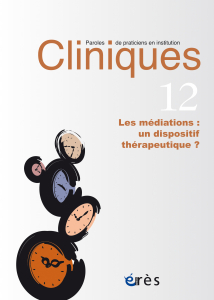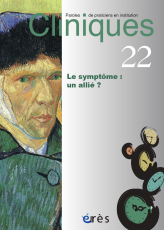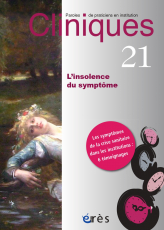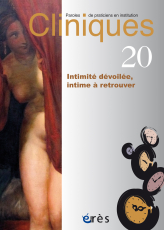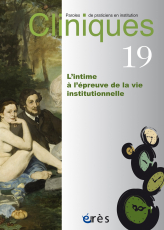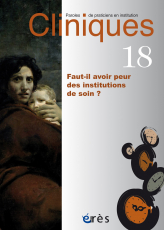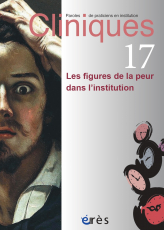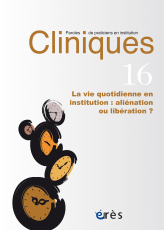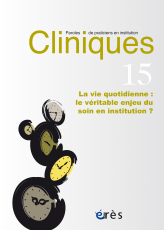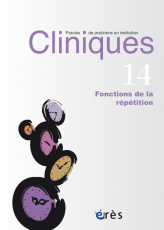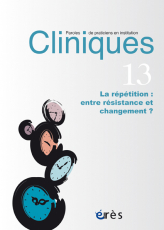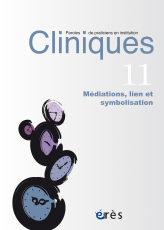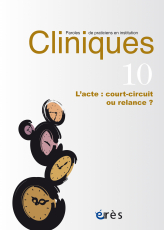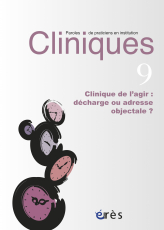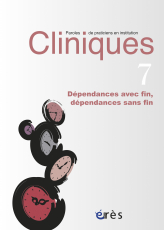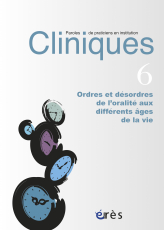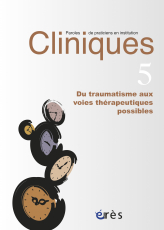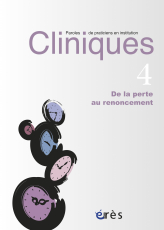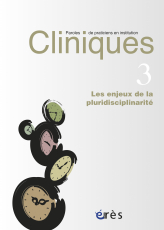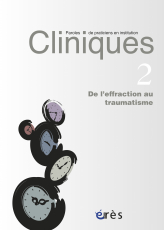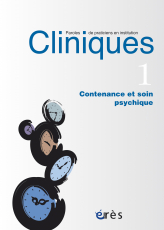Publications
Mediations : a therapeutic device ?
Issue 12 : December, 2016
ISBN : 9782749253459
The development of therapeutic mediations and the efforts put into developing a rigorous modelling of these devices demonstrate the professionals’ increasing interest for these kinds of approaches… Is it a way of responding to a clinical necessity? When identity and narcissistic pains are at the first level, bodies and acts become the privileged messengers of the psychological wanderings that hospitalized patients go through. In such situations, traditional practice, which is only based on the speech, is limited. Professionals working in institutions are then led to develop alternative care devices, called mediated, which aim towards sustaining the transformation processes of the most archaic levels and opening, or re-opening, the way towards a more stable existential foundation. At the crossroads between Winnicot’s thoughts on the potential space, those on the group, those which consider artistic creation as a care vector and those which offer a metapsychological model of mediated care devices, the stories of mediations used in institutions strongly demonstrate the transformation possibilities that these therapeutic adjustments undercover.
But how can mediations be considered as a therapeutic device?
Therapeutic mediations simultaneously support symbolization and create links: between body and mind, past and present, intra-psychological, intersubjective links between members of a group, links among caregivers… “The medium only functions because it places the symbolization process which constitutes it is at the centre of a relationship with others as transference object” (Chouvier, 2011). But when and at what cost does a group using mediation become therapeutic? How can a true metapsychology of these alternative devices be developed?
Authors
Céline ALLAFORT, Cécile ANTIGNY, Patricia ATTIGUI, Gérard BAYLE, Virginie CHAUDUN, Charlotte COSTANTINO, Paul DENIS, Sosthène GODJO, Francis KATCHADOURIAN, Olivia LEMPEN, Zineb MANTRACH, Sylvain MISSONNIER, Agnès MOLARD, Michel MONTHEIL, Anne-Marie PIETRI, Irina POSTOLACHE, Kérel PROUST, René ROUSSILLON, Roxana SANCA, Jean-Marc TALPIN, Laura TREICH
Table of contents
Editorial
Introducing the Thought
1. « Introduction », Charlotte Costantino
Mediations and sensoriality
2. « Voice (Spoken and Sung) in Psychotherapy: Containment and Mobilization of the Archaic », Kérel Proust
3. « Transference and Body-oriented Mediations: From Sensation to Representation », Agnès Molard
4. « Transference Issues at Stake in Expressive Mediation Therapeutic Groups: Contributions and Limits », LauraTreich
Mediation and Dramatisation
5. « Drama, Between Excitement and Drive », Gérard Bayle
6. « What if the Theatrical Game Reinstated a Debate Regarding a Clinical Approach of Psychosis ? », Patricia Attigui
7. « Writings on Stage. Poetry Slam at the Crossroad between Body and Language », Olivia Lempen
Mediations, Storytelling, Historization
8. « Heaven is Where Dead People Live: Discussion Groups for Bereaved Children », Michel Montheil, Virginie Chaudun et Anne-Marie Pietri
9. « Parenthood in Exile : a Multicultural and Multidisciplinary Mediation Group », Céline Allafort, Roxana Sanca, Irina Postolache et Zineb Mantrach
10. « Photolanguage Group: a Melting Pot of Institutional, Collective and Singular Clinic », Jean-Marc Talpin
11. « Mediative Function of a Critical Incident Stress Management: Recovering an Interrupted Story ? », Cécile Antigny, Charlotte Costantino et Francis Katchadourian
Artistic Creation and Creativity
12. « Artistic Creation: a Mirror for Narcissus », Paul Denis
13. « Metapsychological Aspects of Therapeutic Mediations », René Roussillon
14. « Therapeutic Mediations in Institutional Practice, Transversal Perspective and Prospects after an Illuminating Conference », Sylvain Missonnier

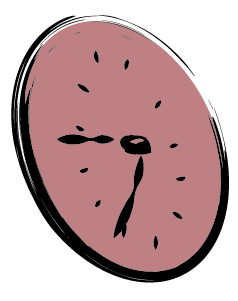 Publications
Publications 